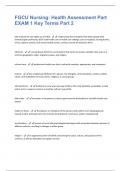FGCU Nursing: Health Assessment Part
EXAM 1 Key Terms Part 2
title VI (6) of the civil rights act of 1964 - a federal law that mandates that when people with
limited English proficiency (LEP) seek health care in health care settings such as hospitals, nursing homes,
clinics, daycare centers, and mental health centers, services cannot be denied to them
ethnicity - a social group within the social system that claims to possess variable traits such as a
common geographic origin, migratory status, and religion
cultural care - professional health care that is culturally sensitive, appropriate, and competent
culture - the nonphysical attributes of a person- the thoughts, communications, actions, beliefs,
values, and institutions of racial, ethnic, religious, or social groups
ethnocentrism - tendency to view your own way of life as the most desirable, acceptable, or best
and to act in a superior manner to another culture's way of life
folk healer - lay healer in the person's culture apart from the biomedical or scientific health care
system
health or illness - the balance or imbalance of the person, both within one's being (physical,
mental, and/or spiritual) and in the outside world (natural, communal, and/or metaphysical)
acculturation - process of social and psychological exchanges with encounters between persons of
different cultures, resulting in changes in either group
religion - an organized system of beliefs concerning the cause, nature, and purpose of the
universe, as well as attendance at regular services
, socialization - the process of being raised within a culture and acquiring the characteristics of that
group
spirituality - a broad term focused on a connection to something larger than oneself, and a belief
in transcendence
values - a desirable or undesirable state of affairs and a universal feature of all cultures
cultural and linguistic competence - a set of congruent behaviors, attitudes, and policies that
come together in a system among professionals that enables work in cross-cultural situations
child emotional abuse - any pattern of behavior that harms a child's emotional development or
sense of self-worth. It includes frequent belittling, rejection, threats, and withholding love and support
child neglect - failure to provide for a child's basic needs (physical, educational, medical, and
emotional)
child physical abuse - physical injury resulting from punching, beating, kicking, biting, burning,
shaking, or otherwise harming a child. Even if the parent or caregiver did not intend to harm the child,
such acts are considered abuse when done purposefully
child sexual abuse - includes fondling a child's genitals, incest, penetration, rape, sodomy,
indecent exposure, and commercial exploitation through prostitution or the production of pornographic
materials
elder abuse - willful infliction of force that results in bodily harm, pain, and/or impairment on a
person age 65 years or older. Examples include pushing, slapping, hitting, shaking, burning, and rough
handling
elder neglect (physical) - physical harm (actual or potential) to a person age 65 years or older
because of failure to provide for the person's well-being. Examples include inadequate feeding and
hydration, unsanitary living conditions, and poor personal hygiene




